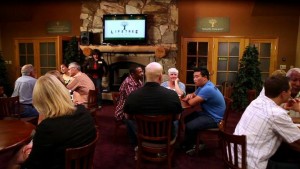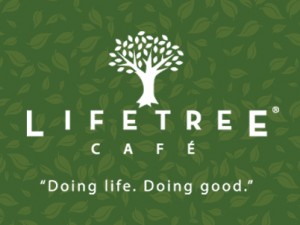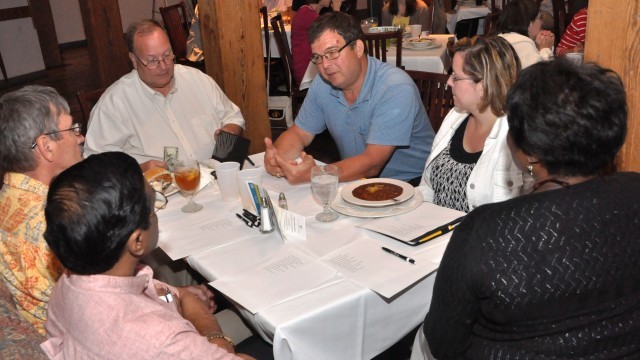Recently I attended my first Lifetree Café national conference in Denver, hosted by the parent company, Group Publishing. Ever since we brought the innovative founders, Thom and Joanie Schultz, to our conference’s Faith Sharing Event in March 2015, it seemed as though the Holy Spirit was moving our conference and me towards investing more time and energy in exploring and developing our own ministry of Lifetree Cafés.
I was initially skeptical because I typically don’t like canned programs that don’t allow for creative and contextual originality. So I needed to study it and assess its worthiness to be a new ministry vehicle in our conference.
I was pleasantly surprised and impressed by their keen strategy and execution and the overall quality of their products–from videos to print materials to presentations. I saw that it was better than anything I, or anyone else I’ve seen, could produce.
The ability to reach new people beyond the church walls and create new gathering places in communities is exactly what The United Methodist Church says it wants and needs. It’s one of our four mission foci. And the overall cost, in comparison to doing new church starts, is most appealing.
The relaxed, non-liturgical fellowship and dialogue experience of Lifetree Cafés will never replace churches and formal worship services. But they offer a necessary alternative in a world that seeks– indeed, demands–creative diversity. Why not give people who are not coming to our churches new places to congregate where they can find the fellowship and faith experience many yearn for? In fact, by God’s grace, new faith communities–maybe even churches–might one day emerge from these birthing places.
As members of our conference’s Congregational Development Team, as well as other church leaders, have attended Lifetree Cafés in our area, we’ve all had different reactions. Some of us resisted the idea that a café could be like a church. Some thought it did not really do discipling. Some wondered where the Bible study and prayer time was. Some wondered how this would get people into our churches.
Reflecting on these questions, I began to realize that we think like the “churched” people we are, but we need to think like the “unchurched.” Reaching the millennial generation and others who are suspicious of organized religion requires a different way of thinking.
To reach millennials, “nones,” “dones” and other unchurched folks requires a whole new approach. What we have found and discussed at the Lifetree Café national conference is that these folks don’t like the emphatic dogma of the church. They don’t like the judgmental mentality many perceive, nor the bureaucracy that too often seems to hinder or destroy worthwhile ministries.
On the other hand, the presence of lay volunteers so essential to Lifetree Cafés –including new members not steeped in formal church culture–can be very attractive to people who are suspicious of clergy and organized religion.
The heart of Lifetree Café is a place where you can have conversation about many areas of life without feeling judged or alienated. Unfortunately, most of our churches don’t provide such a venue.
What I like about Lifetree Café is its field-tested, approachable yet thought-provoking discussion materials that allow for open conversation and relationship-building opportunities. There is always at least one short Bible verse read and one prayer moment in every hour-long presentation.
There are many opportunities to share your thoughts and questions, your life and faith experience in any of the conversations taking place over coffee or other beverages, around tables of four or five folks. It’s relaxed but focused, thanks to the facilitator who shows video clips and guides discussion.
The overall program–or Café recipe–is packaged and made easy for anyone to be able to present. The videos are insightful, personable and often compelling. All that’s really needed to do the presentations are a laptop and DVD player, a projector or television monitor, a microphone and a prepared, friendly facilitator to follow the script, keep things moving and make participants feel comfortable.
Some participants, wanting more sustained and meaningful interaction, have chosen to join study groups or gather for hands-on ministry or activities. Others may visit a host church for worship, Bible study or a special event, and possibly even return.
In my view, Lifetree Café–like the new one meeting in Lititz and organized by United Methodists there–offers many opportunities to plant raw seeds in fertile ground, nurture them and let God take it from there. We may never see some persons again, and we may never know what became of them. But if we have done our part, we can trust that at some point in their lives God will give the increase. And God may well do the same for us.
By the Rev. Gordon Hendrickson
Conference Congregational Development Coordinator
Learn more on our Website about the Eastern PA Conference’s efforts to help churches develop Lifetree Cafés. Also please support the growth of this new ministry through your prayers, presence, gifts and service. Send checks, made out to the “Eastern PA Conference,” to the Conference Office, to the attention of Rev. Gordon Henderson, and indicate on the memo line: “Ministry with Millennials,” which is a new conference initiative in partnership with Gordon’s nonprofit, Acts 6.
New Lifetree Cafe Orientation: The Congregational Development Office has scheduled a new two-part orientation series on how to organize a Lifetree Cafe (for a church or church cluster or mission connection). Anyone may attend Part 1 on Jan. 4 or 6, and then attend Part 2 on Jan. 25 or 26. Each training will take place from 6:30 to 8 PM at the Eastern PA Conference Office, 980 Madison Ave., Norristown. Just choose one date for each part, but please let Gordon know when you will attend at gordonacts6@gmail.com.

